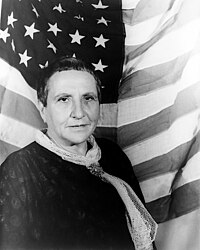Gertrude Stein
| Gertrude Stein | |
|---|---|

Stein in 1935 photographed by Carl Van Vechten
|
|
| Born |
February 3, 1874 Allegheny, Pennsylvania, U.S. |
| Died | July 27, 1946 (aged 72) Neuilly-sur-Seine, France |
| Occupation | Writer, poet |
| Nationality | American |
| Literary movement | Modernist literature |
| Partner |
Alice Babette Toklas 1907–1946 (Stein's death) |
|
|
|
| Signature |  |
Gertrude Stein (February 3, 1874 – July 27, 1946) was an American novelist, poet, playwright, and art collector. Born in the Allegheny West neighborhood of Pittsburgh, Pennsylvania, and raised in Oakland, California, Stein moved to Paris in 1903, and made France her home for the remainder of her life. She hosted a Paris salon, where the leading figures of modernism in literature and art, such as Pablo Picasso, Ernest Hemingway, F. Scott Fitzgerald, Sinclair Lewis, Ezra Pound, and Henri Matisse would meet.
In 1933, Stein published a kind-of memoir of her Paris years, The Autobiography of Alice B. Toklas, written in the voice of her life partner, Alice B. Toklas, an American-born member of the Parisian avant-garde. The book became a literary bestseller and vaulted Stein from the relative obscurity of the cult-literature scene into the limelight of mainstream attention. Two quotes from her works have become widely known: "Rose is a rose is a rose is a rose" and "there is no there there", with the latter often taken to be a reference to her childhood home of Oakland, California.
Her books include Q.E.D. (Quod Erat Demonstrandum) (1903), about a lesbian romantic affair involving several of Stein's female friends; Fernhurst, a fictional story about a romantic affair; Three Lives (1905–06) and The Making of Americans (1902-1911). In Tender Buttons (1914), Stein commented on lesbian sexuality.
...
Wikipedia
